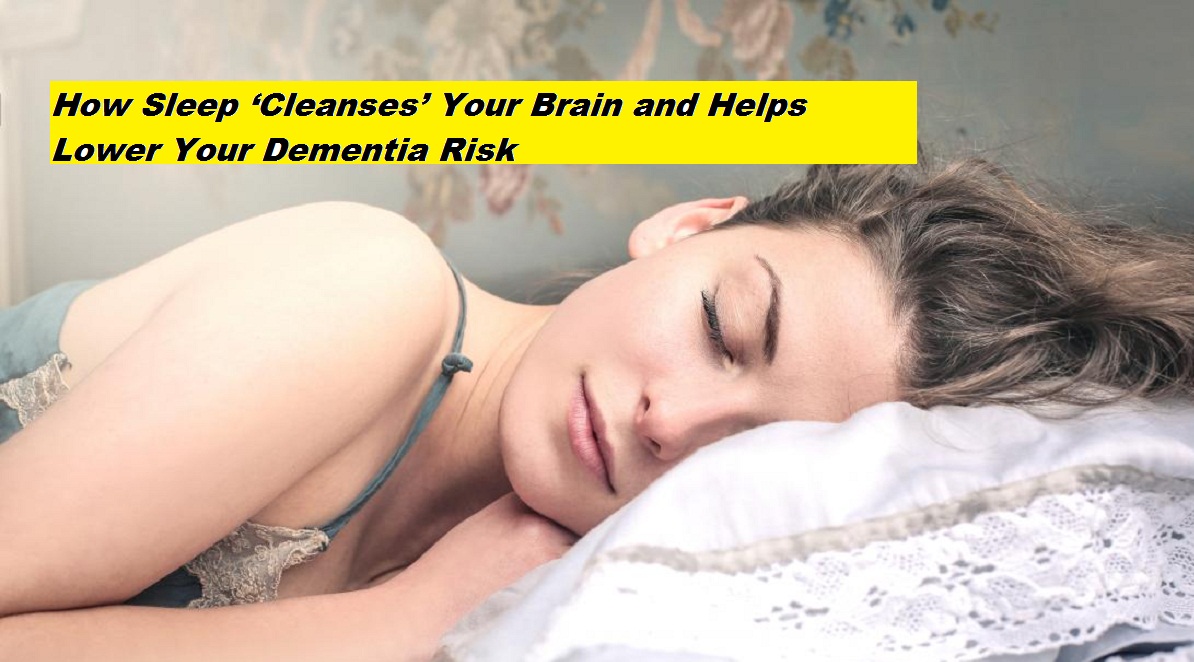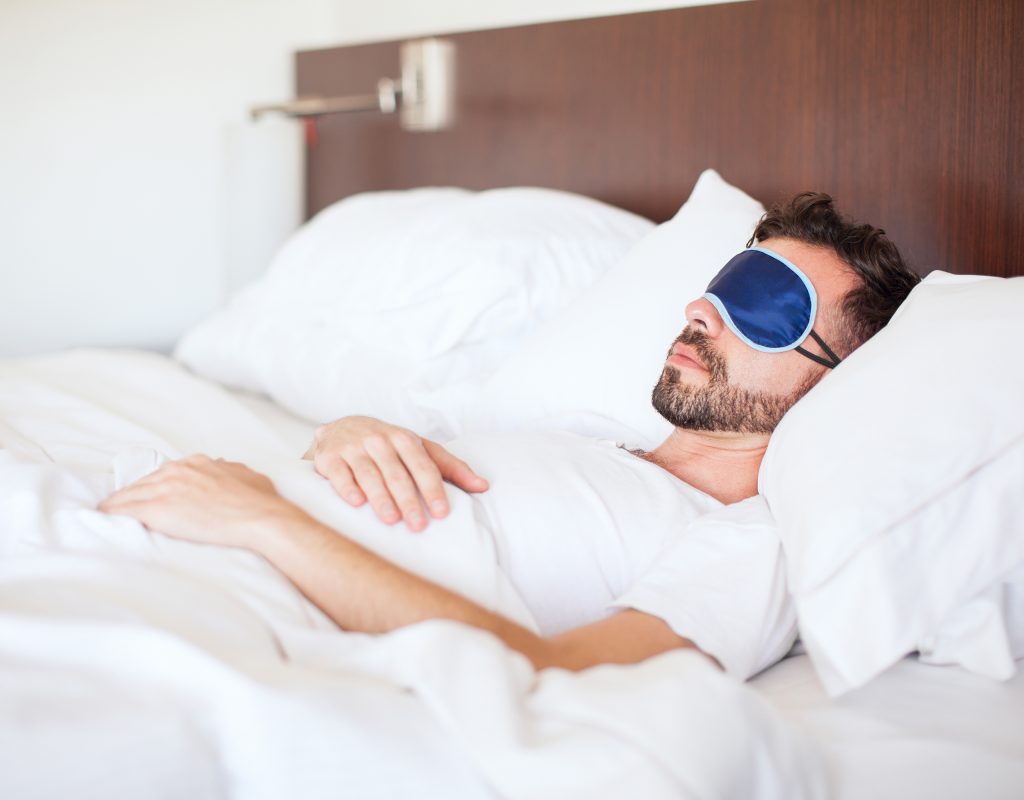How Sleep ‘Cleanses’ Your Brain and Helps Lower Your Dementia Risk

Sleep is a time for resting… or is it?Research from Boston University describes our brains as engaging in a “cleansing flood” while we sleep that helps ward off diseases such as dementia.This research builds on previous findings that have shown our brains are working rather than resting during sleep.
The exact process taking place involves our glymphatic system, a waste clearance system for our central nervous system.While we’re awake, precursor proteins called amyloid-betas spike and accumulate in our brain.
During our sleeping hours, our brain flushes this amyloid-beta, preventing them from forming into plaque and damaging our neurons. Without adequate sleep, our brain can’t effectively wash away these precursor proteins. Their accumulation has been associated with a higher risk of dementia due to the damaged neurons.

The research adds new insight into the sleep-dementia connection.
What experts have to say
While we’re sleeping, our glymphatic system goes into full action to clear proteins, toxins, and waste products.Poor sleep makes the glymphatic system less efficient. These proteins are toxic to the cell, to the neuron, and their accumulation could lead to inflammation and degeneration of those neurons in the brain that over time may contribute to Alzheimer’s dementia.
Now, we cannot say that if you’re sleeping 4 hours a night that in 20 years, you’re going to develop Alzheimer’s dementia. No one has shown that yet.What we’re saying is that there is a trend.The Alzheimer’s Association agrees it’s still too early to determine a causal relationship.
Evidence is building that sleep disturbances — like sleep apnea or disruptions in sleeping patterns — may increase risk of later life Alzheimer’s and dementia, or may even be an early sign of these diseases.
But more research is needed to understand the relationship between sleep and dementia. For example, do brain changes caused by the disease cause sleep disruptions, or do changes in sleep patterns increase risk of dementia? Or both?
Alzheimer’s Association has funded researchers doing work in this area, including Dr. Andrew Varga, a neuroscientist and physician at the Mount Sinai Integrative Sleep Center in New York. He’s researching how sleep disruption may lead to a more rapid buildup of tau, an abnormal brain protein related to Alzheimer’s disease.
Defining a good night’s sleep

An adequate sleep is about both quantity and quality. A common misconception is that as people age, they need less sleep.That is absolutely incorrect, whether you are 18 or 80. For people over 18, sleep quantity must be and has to be between 7 and 8 hours on a regular basis. This is the consensus recommendation for good health.
The hours of sleep can’t be broken up between nighttime sleep and daytime naps. It has to be consecutive sleeping.In terms of quality, adequate sleep is defined by the stages of sleep.The stages of sleep are all essential for promoting good health, say experts.
For example, if someone sleeps for 7 or 8 hours and they wake up and they’re groggy, it tells us there is an issue. Maybe there is an issue that disrupts sleep. An example is pain, or sleep apnea medications, or alcohol, that tends to disrupt sleep continuity.What sleep experts are concerned with is whether someone wakes up feeling refreshed.
The consequences of poor sleep
Beyond the sleep-dementia risk lies a host of additional concerns related to getting inadequate sleep.Poor sleep can lead to multiple problems throughout the body. Physically, poor sleep can result in trouble managing weight, and diabetes and thyroid dysfunction due to hormone dysregulation. It’s in the deeper stages of sleep when our hormones ‘reset’.
Mentally, poor sleep can lead to anxiety, depression, poor memory, and degenerative diseases like Alzheimer’s and dementia. This can occur especially if we have an underlying sleep disorder and/or don’t sleep long enough.It is thought that our nervous system and memories are maintained during our REM sleep. Oftentimes our REM stages of sleep are the first stages to get ‘skipped’ during sleep issues or disorders.
How to improve your sleep quality
Experts say if you’re not feeling refreshed upon waking, or if you’re experiencing sleep issues such as snoring or falling asleep during daytime hours, consult with your primary care physician.Discovering the root of the issue is crucial to finding the right solution.It is common for people to be carrying around too much stress, especially due to the COVID crisis.
Get outside and get moving
Fresh air and exercise can help calm and tire you out, while vitamin D from the sunshine helps regulate circadian rhythms to keep your sleep consistent.
Establish a bedtime routine
Consistency in your bedtime routine each night can go a long way in helping you achieve better quality sleep. Your body will naturally take cues and prompt drowsiness from the steps you regularly take to wind down, such as reading, taking a warm bath, or writing in a journal.
Style your bedroom for sleep
Keep temperatures cool, gadgets and electronics to a minimum, and bedding comfortable yet simple.Also check your pillows to make sure they pack the perfect amount of “pouf” — not too hard or too soft so your head and neck are comfortably supported.
Nix daytime naps
With extra time on your hands, or perhaps because of working from home, it may be easy and enticing to sneak in a daytime nap.While the occasional nap can be a great reset for the rest of the day, it may rob you of the more important and restorative sleep your body needs at night.
Consider what you watch on TV
Listening to discouraging reports about the new coronavirus on the evening news before bed may not be a good idea and could keep your mind racing throughout the night.Opt for shows that are lighter and more entertaining later in the day.
Set a wake-up time and stick to it 7 days a week
Even if you go to bed late one night or have trouble falling asleep, keep your wake-up time the same.This is particularly important during the pandemic, when many of us are pushing our wake-up times later. The wake-up time you set for yourself doesn’t have to be early. It just has to be consistent.
Stop ‘trying’ to sleep if you’re anxious about sleeping
Find something quiet to do, like read or watch TV (though nothing too upsetting or stimulating). When you feel sleepy again, get back in bed.If it’s a difficult night, you might have to do this a few times. This works because worrying about sleep and lying in bed trying to sleep perpetuates insomnia.
Stop checking the clock
If you don’t know what time it is, you can’t start counting how much time is left in the night to sleep. If you have an alarm clock in your room, turn it around. As long as you have an alarm set, you don’t need to know the time.
Stop tracking your sleep
Smartwatches don’t adequately track sleep; they track movement. So, use your smartwatch during the day and take it off at night.










